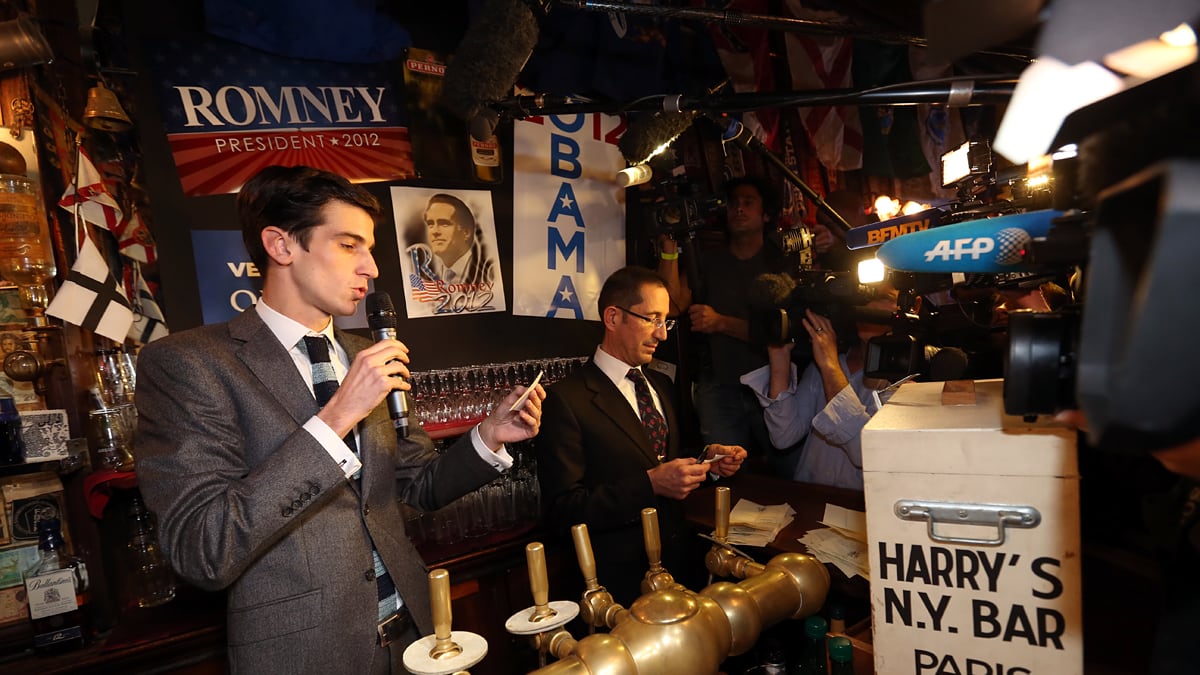Europe —and much of the rest of the world —breathed a collective sigh of relief at the news of President Barack Obama’s win of a second term. The front page of the French daily Libération captured the sympathy and the sentiment: Obama leaned back smiling behind the one-word headline, in English, “YES!” Earlier in the evening, a straw poll at the popular Paris watering hole, Harry’s Bar, gave Obama 305 votes to 182.

Mitt Romney’s charms never did travel well. Left-leaning Europe (and even the European center-right tends to be leftish by American standards) found the Republican Party’s economic, security and social policies all but incomprehensible. A BBC poll late last month showed that about 50 percent of more than 21,000 respondents abroad favored Obama over Romney, with the Republican leading only in Pakistan. In France, Obama’s approval rating was a whopping 72 percent against Romney’s 2 percent.
Yet the spectacle of a United States bitterly divided during a savagely negative campaign also provoked a closer examination of the president and his personality. In a profile posted along with news of the election results, the respected French daily Le Monde dubbed Obama “Mr. (faux) Cool," stripping way some of the myth to reveal the aloof introvert that many Americans have found distasteful and disappointing. The Spanish newspaper El País declared on its Web site that this election was about “One President for a Divided Country.”
After four very difficult years for the United States and the global economy, Obama’s numinous smile no longer inspires as much hope and confidence as before. But the line from his victory speech that “the best is yet to come” was repeated on front pages in almost every language of Europe. In the Old World people have long memories. And so Obama still scores points for not being George W. Bush, who is widely regarded as the instigator of unnecessary American wars while also responsible for the financial crisis that brought the world to the brink of a new Great Depression. And whereas many Americans found Romney a persuasive salesman of moderation after the first debate, across the Atlantic his scoutmaster smile did nothing to obscure the perceived extremism of the Republican Party that nominated him.
Obama’s policies are seen as rooted in common sense. Are Americans better off than they were four years ago? From afar the record seem unassailable. The crash of 2008 was a plunge toward the abyss, and Obama helped bring everyone back from the brink. Was it high time to be ending the Iraq and Afghan wars? Yes. And America’s NATO allies are only too happy to join in the exit. Does it make better sense to organize health care around universal participation than to force millions of Americans to risk their lives playing emergency room roulette? To Europeans, that seems perfectly obvious.
Every day, it seemed to many Europeans, headlines reminded them of what appeared to be a lunatic core among the Republicans who forced longtime voices of reason to retreat or retire. Thus Richard Lugar, the wise and venerable senator from Indiana, who was well-known to European statesmen for decades—indeed, for generations—was defeated in the Republican primary. To be replaced by a Tea Party partisan named Richard Mourdock who went on to opine that pregnancy resulting from a rape can be “something that God intended to happen.” It is a minor relief to European analysts, but a real one, that Democrat Joe Donnelly defeated Mourdock in Tuesday’s vote and the Democrats continued to hold onto the Senate.
Looking ahead, European analysts clearly feel comfortable with the notion that Obama would pursue, or renew, foreign policy initiatives that began, or faltered, in his first term: the search for a Middle East peace settlement; a more coherent approach to the Syrian conflict. Europe didn’t figure in any way in most of Obama’s speeches, or in the foreign policy debate with Romney. But Obama’s efforts to develop solid multilateral diplomacy have been much appreciated by European leaders, whether Washington was “leading from behind” in Libya to overthrow the Gaddafi dictatorship last year, or pulling together crippling sanctions aimed at the nuclear ambitions of Iran. “More than any previous US President,” says Daniel Keohane of the European think tank Fride, “Obama has strongly supported European efforts to create a stronger EU role in foreign policy.”
The greatest concern of Europe remains economic, however. While American growth may be disappointing, at least it is growth, with the potential to help pull the stagnant and shrinking economies of Europe out of the mire. International Monetary Fund Managing Director Christine Lagarde has made it clear that Europe could be plunged into a very deep recession, or worse, if Washington does not pull back from the fiscal cliff created by Congress and the Obama administration.
The sudden expiration of the Bush-era tax cuts and credits would suck out what little air is left in the U.S. economy and almost certainly stifle such positive signs as exist in Europe. If there is another refusal by the House of Representatives to raise the debt ceiling, which used to be almost automatic, the U.S. could see its bond ratings plunge and borrowing costs soar. The IMF has said, in its measured language, that solving these problems is “imperative.” But that is no guarantee that the compromises can be made by the ferociously divided politicians in Washington. So, while Europe may say “Yes!” to Obama’s reelection, there’s a growing realization that’s just not the same as “Yes we can!”




